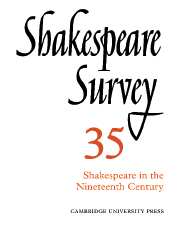Book contents
- Frontmatter
- Before the Shakespeare Revolution: Developments in the Study of Nineteenth-Century Shakespearian Production
- The Meininger Company and English Shakespeare
- Shakespeare at the Burgtheater: From Heinrich Anschütz to Josef Kainz
- Shakespeare on the Melbourne Stage, 1843-61
- Shakespeare in Hazlitt’s Theatre Criticism
- Characterization of the Four Young Lovers in A Midsummer Night’s Dream
- Queenly Shadows: On Mediation in Two Comedies
- Language, Theme, and Character in Twelfth Night
- The Art of the Comic Duologue in Three Plays by Shakespeare
- ‘Spanish’ Othello: The Making of Shakespeare’s Moor
- Ferdinand and Miranda at Chess
- Shakespeare’s Latin Citations: The Editorial Problem
- The Theatre at Christ Church, Oxford, in 1605
- Interpretations of Shakespearian Comedy, 1981
- The Year's Contributions to Shakespearian Study 1 Critical Studies
- 2 Shakespeare’s Life, Times and Stage
- 3 Textual Studies
- Index
- Plate Section
3 - Textual Studies
Published online by Cambridge University Press: 28 March 2007
- Frontmatter
- Before the Shakespeare Revolution: Developments in the Study of Nineteenth-Century Shakespearian Production
- The Meininger Company and English Shakespeare
- Shakespeare at the Burgtheater: From Heinrich Anschütz to Josef Kainz
- Shakespeare on the Melbourne Stage, 1843-61
- Shakespeare in Hazlitt’s Theatre Criticism
- Characterization of the Four Young Lovers in A Midsummer Night’s Dream
- Queenly Shadows: On Mediation in Two Comedies
- Language, Theme, and Character in Twelfth Night
- The Art of the Comic Duologue in Three Plays by Shakespeare
- ‘Spanish’ Othello: The Making of Shakespeare’s Moor
- Ferdinand and Miranda at Chess
- Shakespeare’s Latin Citations: The Editorial Problem
- The Theatre at Christ Church, Oxford, in 1605
- Interpretations of Shakespearian Comedy, 1981
- The Year's Contributions to Shakespearian Study 1 Critical Studies
- 2 Shakespeare’s Life, Times and Stage
- 3 Textual Studies
- Index
- Plate Section
Summary
The notable work of the year in Textual Studies has been the support and momentum given to the thesis that there are two texts of King Lear, both Shakespearian, both acceptable. The year has produced one article and two book-length studies of the problem. The article ‘The War in “ King Lear ”’, by Gary Taylor, was noticed in these columns after its oral presentation in 1980. An important contribution to the argument, it reinforces the position taken by Steven Urkowitz in Shakespeare’s Revision of ‘ King Lear’. One chapter in this volume, ‘The Role of Albany in the Quarto and Folio’, argues in detail the position advanced by Michael J. Warren in his seminal paper delivered at the International Shakespeare Association Congress in 1976, but the remarkable value of the study resides in Urkowitz’s keen sense of the dramatic spectacle–action on stage. ‘Variants [from the Quarto] in the Folio text introduce complex changes in characterization [e.g. Albany], as well as simpler adjustments in the rhythms and the sense of dialogues. Major variants also create new designs for individual scenes and for the succession of scenes. Other significant variants present revised instructions to individual actors and to groups of actors for their entrances and exits. . . . With only one or two exceptions, . . . [all of these] variants may be seen as intentional revisions, in the light of the ordinary dramatic practices of Shakespeare and his acting company’ (p. 17).
- Type
- Chapter
- Information
- Shakespeare Survey , pp. 179 - 192Publisher: Cambridge University PressPrint publication year: 1982

